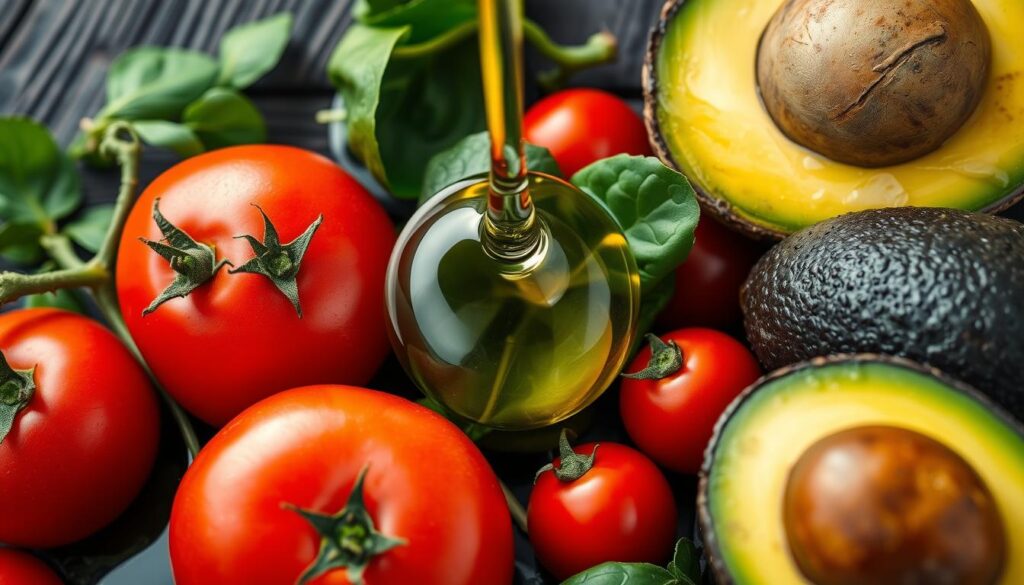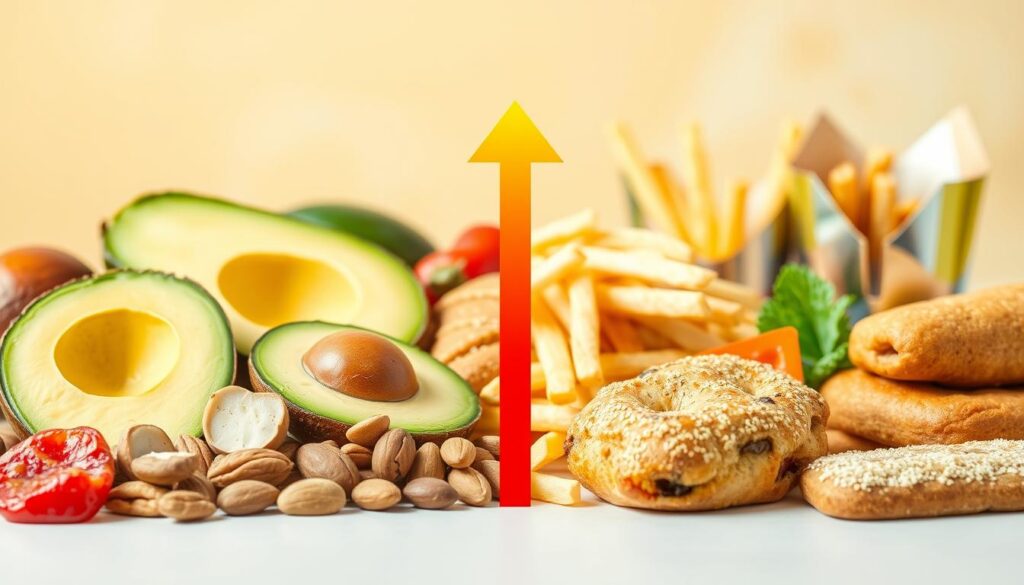Are you tired of checking ingredient lists for hidden dangers in your favorite foods? It’s time to take charge of your health and ditch hydrogenated oils. This guide will reveal the truth about these harmful additives. You’ll learn how to make choices that are good for your body and soul.
Key Takeaways
- Hydrogenated oils are a leading cause of heart disease and other health issues.
- Identifying and avoiding these oils in processed foods is crucial for a heart-healthy diet.
- Discover delicious and nutritious alternatives to hydrogenated oils for your cooking and baking needs.
- Learn how to read food labels and make smart shopping decisions to eliminate trans fats from your pantry.
- Explore the latest regulations and industry trends surrounding the use of hydrogenated oils.
Understanding Hydrogenated Oils and Their Health Impact
When we talk about eating healthier, it’s key to know about hydrogenated oils. These oils are made through hydrogenation and are found in many processed foods. But, their health effects have raised concerns lately.
The Chemical Process of Oil Hydrogenation
Hydrogenation changes liquid oils into solid fats. It adds hydrogen atoms to the oil, making it more stable and lasting longer. But, this process also creates non-partially hydrogenated fats, or trans fats, which are harmful to our health.
Health Risks Associated with Hydrogenated Fats
Research shows that eating saturated fat-free hydrogenated fats can harm our heart health. It can raise bad cholesterol and lower good cholesterol. This can lead to heart disease and stroke. Also, these fats may increase the risk of type 2 diabetes and some cancers.
Common Sources in Processed Foods
Hydrogenated oils are in many processed foods like baked goods, fried foods, and snacks. It’s vital to check food labels for these oils. They might be listed as “partially hydrogenated” or “hydrogenated vegetable oil.”
| Food Category | Potential Sources of Hydrogenated Oils |
|---|---|
| Baked Goods | Cookies, cakes, pies, pastries, crackers |
| Fried Foods | French fries, doughnuts, fried chicken |
| Spreads | Margarine, shortening, non-dairy creamers |
| Snacks | Chips, popcorn, granola bars, microwave popcorn |
Knowing about hydrogenated oils and their health risks helps us make better food choices. We can choose a non-partially hydrogenated, saturated fat-free diet for better health.

“The fact is, the more we know about hydrogenated oils, the more we realize they have no place in a healthy diet.”
The Rise and Fall of Trans Fats in the Food Industry
The food industry’s journey with trans fats has been complex. These artificial fats were once seen as a cheap substitute for natural oils. But, as health risks grew, the industry started moving towards cholesterol-conscious and unprocessed fats.
In the 1950s, food makers wanted something cheaper and longer-lasting than natural oils. They turned liquid vegetable oils into solid fats through hydrogenation. This made them perfect for baked goods, snacks, and more.
For years, trans fats were everywhere in American food. They raised cholesterol-conscious levels and health problems. But, as science showed their dangers, attitudes started to change.
“The consumption of trans fats has been shown to increase the risk of coronary heart disease by raising levels of low-density lipoprotein (LDL) cholesterol, also known as ‘bad’ cholesterol, and lowering levels of high-density lipoprotein (HDL) cholesterol, or ‘good’ cholesterol.”-American Heart Association
As health worries grew, many companies stopped using trans fats. Countries also set rules to limit or ban them. This move to unprocessed fats changed the industry, making products healthier and more transparent.

The story of trans fats shows how the food industry has changed. It highlights the need for cholesterol-conscious choices and the value of unprocessed fats for a healthier future.
No Hydrogenated Oils: Making the Switch to Healthier Alternatives
Are you ready to say goodbye to hydrogenated oils and hello to natural, plant-based ones? Get ready for a culinary adventure that will make your body happy and your taste buds dance! We’ll look at the best plant-based oils, why smoke points matter, and how to store them right.
Natural Plant-Based Oil Options
There are many plant-based oils to choose from. You can find everything from the rich taste of extra virgin olive oil to the tropical flavor of coconut oil. Other great options include avocado oil, grapeseed oil, and peanut oil, each with its own special benefits and uses in cooking.
- Extra Virgin Olive Oil: A Mediterranean favorite known for its antioxidants and unique taste.
- Coconut Oil: It has a lovely smell and many health benefits, like MCTs.
- Avocado Oil: It has a high smoke point and a creamy texture, great for cooking at high heat.
- Grapeseed Oil: A light oil with a neutral taste, perfect for baking and sautéing.
- Peanut Oil: It has a high smoke point and keeps flavors when frying.
Understanding Smoke Points
The smoke point is very important when choosing healthy cooking oils. It’s the temperature where an oil starts to smoke and lose its good qualities. Knowing the smoke points helps you pick the right oil for your cooking, keeping your food and health safe.
Storage and Shelf Life Considerations
Keeping your plant-based oils in good condition is crucial. Store them in a cool, dark spot, away from sunlight and heat. Also, check the expiration dates and watch for any signs of spoilage. By following these tips, you can keep your oils fresh for longer and enjoy their benefits.
“Choosing the right plant-based oils for your kitchen can be a game-changer in your journey towards healthier eating.”
Reading Food Labels: Identifying Hidden Hydrogenated Oils
Shopping for food can be tricky if you want to avoid no hydrogenated oils and unhealthy natural lipids. But, by carefully reading food labels, you can make smart choices. This way, you can steer clear of trans fats in your favorite packaged foods.
Start by learning the different names for hydrogenated oils. These might be called “partially hydrogenated” oils, “shortening,” or “partially hydrogenated vegetable oil.” Watch out for these terms. They usually mean the product has unhealthy trans fats you should avoid.
- Scan the ingredient list for any mentions of hydrogenated or partially hydrogenated oils.
- Be wary of products that list “shortening” or “vegetable shortening” as an ingredient.
- Look for natural lipids like olive oil, avocado oil, or coconut oil as healthier alternatives.
Choose products with fewer ingredients. Whole, minimally processed foods are best. They give you the best natural lipids for your body.
Reading food labels is the key to making informed, healthy choices. Stay vigilant and say no to hydrogenated oils!”
With these tips, you’ll become a pro at reading food labels. Remember, knowing what to look for helps you avoid hydrogenated oils and choose better, natural lipids. Enjoy your healthy shopping!
Heart-Healthy Cooking Oils for Your Kitchen
Choosing the right heart-healthy ingredients and healthy cooking oils is key for a balanced diet. This supports overall well-being. Let’s look at some top oil choices for your kitchen.
Extra Virgin Olive Oil Benefits
Extra virgin olive oil is known for its health perks. It’s full of monounsaturated fats and antioxidants. These help lower cholesterol and reduce heart disease risk.
Its strong taste and low smoke point are great for dressings, marinades, and light sautéing.
Coconut Oil and Its Properties
Coconut oil is popular for its special properties. It’s rich in medium-chain triglycerides (MCTs), which may boost metabolism and aid in weight management. Its high smoke point is perfect for baking and stir-frying.
Avocado Oil Applications
Avocado oil is a healthy cooking oil you should have. It’s full of monounsaturated fats, which can lower bad cholesterol and raise good cholesterol. Its mild taste and high smoke point are ideal for high-heat cooking, grilling, and roasting.
| Oil | Smoke Point | Health Benefits | Best Uses |
|---|---|---|---|
| Extra Virgin Olive Oil | 375-400°F | Lowers cholesterol, rich in antioxidants | Dressings, marinades, light sautéing |
| Coconut Oil | 400-450°F | May boost metabolism, supports weight management | Baking, stir-frying, high-heat cooking |
| Avocado Oil | 400-520°F | Lowers bad cholesterol, raises good cholesterol | High-heat cooking, grilling, roasting |
Using these heart-healthy cooking oils in your cooking can make meals tasty and good for your heart. Remember, eat in moderation and mix up your healthy ingredients for a lively, nourished life.
The Science Behind Unprocessed Fats and Wellness
Exploring healthier eating means understanding unprocessed fats and their wellness benefits. These natural lipids offer advantages that can change our well-being for the better.
Unprocessed fats, like those in avocados, nuts, and extra virgin olive oil, are full of essential fatty acids. These fats are crucial for a healthy body. They help control inflammation, support heart health, and boost brain function.
One big plus of unprocessed fats is they give us energy that lasts. They don’t cause blood sugar spikes like refined carbs do. This steady energy keeps us alert and focused, improving our productivity and well-being.
| Unprocessed Fat | Health Benefits |
|---|---|
| Extra Virgin Olive Oil |
|
| Avocado |
|
| Nuts and Seeds |
|
Adding these unprocessed fats to our diets brings many benefits. They improve our brain function, mood, and energy levels. The science shows that using unprocessed fats and natural lipids is key to a happier, healthier life.
“The secret to a long and healthy life lies in the careful balance of natural, unprocessed fats in our diet.”
As we move towards healthier eating, let’s explore more about these amazing unprocessed fats. We can unlock the full potential of wellness.
Practical Tips for Trans Fat-Free Shopping
Shopping for groceries can be tough when you want to avoid hydrogenated oils and trans fats. But don’t worry! We’ve got some easy tips to help you shop for trans fat-free foods.
Using Food Scan Genius for Smart Choices
Food Scan Genius is a handy app that helps you find foods without hydrogenated oils. Just scan the barcode, and it tells you if it’s trans fat-free. This makes it easy to pick trans fat-free and no hydrogenated oils products.
Restaurant Dining Guidelines
Eating out can be challenging, but you can still make healthy choices. Choose dishes with heart-healthy oils like extra virgin olive oil or avocado oil. Avoid fried foods, which often have unhealthy trans fats.
Ask about the cooking methods and oils used. Your health is important, so it’s worth asking.
With these tips, you’ll be great at trans fat-free shopping and dining. Explore the tasty world of no hydrogenated oils and live a healthier life.
Making the Transition: Pantry Makeover Guide
Starting a healthier lifestyle can feel overwhelming. But, with a few easy steps, you can change your pantry to healthier, non-partially hydrogenated foods. Let’s start a pantry makeover journey. It will help you succeed in using plant-based oils and avoiding hydrogenation.
Step 1: Take Stock
Begin by checking your pantry. Look for items with hydrogenated or partially hydrogenated oils. This includes baked goods, snacks, and processed foods. Put these items in a “replace” pile.
Step 2: Research Healthier Options
- Learn about plant-based oils like extra virgin olive oil, avocado oil, and coconut oil. They can replace hydrogenated fats.
- Find out what makes each oil special. This will help you pick the best one for cooking and baking.
- Consider their smoke points, shelf life, and flavors. This ensures you pick the right oil for your needs.
Step 3: Start Swapping
Begin replacing items in your “replace” pile with healthier options. Choose whole, unprocessed foods. Always read labels to avoid hidden hydrogenated oils.
| Product | Replace With |
|---|---|
| Hydrogenated Vegetable Oil | Olive Oil, Avocado Oil, or Coconut Oil |
| Shortening | Plant-based Butter or Coconut Oil |
| Margarine | Olive Oil-based Spread or Avocado Oil |
Changing gradually and finding good replacements for your favorite dishes is key. It makes the transition smoother and helps you stay on track.
Starting this pantry makeover is a big step towards a healthier you. With a bit of effort and a desire to try new things, you’ll have a kitchen that celebrates plant-based oils.
Cooking Methods That Preserve Oil Quality
Healthy cooking starts with the quality of your oils. Learning to control temperature and reuse oils wisely is key. This way, you get the most from your healthy cooking oils and keep their nutritional benefits.
Temperature Control Techniques
Keeping your healthy cooking oils at the right temperature is crucial. Here are some tips to help:
- Avoid high heat: High temperatures can damage your oils, creating harmful compounds. Use low to medium heat for better results.
- Monitor closely: Use a digital thermometer to watch your oil’s temperature. Adjust the heat to keep it in the optimal range.
- Reheat thoughtfully: Let used oil cool completely before reheating. Sudden temperature changes can harm the oil’s quality.
Best Practices for Oil Reuse
Reducing waste is key to maintaining saturated fat-free cooking. Follow these guidelines to reuse your oils effectively:
- Filter and store properly: Strain your oil through a fine-mesh sieve after each use. Then, store it in an airtight container in a cool, dark place.
- Monitor for signs of degradation: Watch for changes in color, clarity, or consistency. These signs mean the oil is no longer good to use.
- Limit reuse: For the best quality and safety, use your oil no more than 3-4 times before discarding it.
By using these techniques and practices, you’ll cook with healthy cooking oils that are nutritious and flavorful. It’s great for your health and taste buds!
Global Regulations and Standards for Hydrogenated Oils
In the United States, the FDA has made big moves against hydrogenated oils. In 2015, they said partially hydrogenated oils are not safe for us. This means they banned them in food products. Now, food makers are switching to healthier options instead of hydrogenated oils.
Other countries are also cracking down on hydrogenated oils. The European Union has strict rules on trans fats in food. Countries like Denmark, Norway, and Austria have banned foods with too much trans fat. These rules show the world is moving towards healthier food choices.
But, there’s still work to do to get rid of hydrogenated oils everywhere. We need more education and policies to help. This will help people make better food choices and push the industry towards healthier options. We’re making progress towards a healthier food world, and that’s something to celebrate.
FAQ
What are hydrogenated oils and why should they be avoided?
Hydrogenated oils are processed fats made by adding hydrogen to vegetable oils. This makes them solid and stable. But, it also creates harmful trans fats. These fats can raise cholesterol and increase heart disease risk. It’s important to choose unprocessed fats for a healthy diet.
How can I identify hydrogenated oils in the foods I buy?
Check food labels for “hydrogenated” or “partially hydrogenated.” These terms mean there are trans fats. Look for “trans fat-free” or “no hydrogenated oils” instead.
What are some healthier alternatives to hydrogenated oils?
Try plant-based oils like extra virgin olive oil, avocado oil, and coconut oil. These natural fats are good for your heart and can be used in cooking and dressings.
How do I properly store and use healthy cooking oils?
Keep healthy oils in a cool, dark place. This helps them last longer. Also, know the smoke point of each oil. Use oils with high smoke points for high heat, and those with low smoke points for low heat.
What are the benefits of switching to a diet low in hydrogenated oils?
Eating less hydrogenated oil can lower cholesterol and improve heart health. It also reduces the risk of heart disease and type 2 diabetes. A diet full of plant-based fats supports wellness and weight management.





